|
The conventions of the Western are so well established and so widely recognised that we tend to regard the genre as relatively safe ground, particularly if the film in question was made before The Wild Bunch came along and turned things on their head. If you sit down for a western that was made back in the 40s or 50s, you have certain expectations that will usually be met, expectations about the setting, the characters, the storylines and the iconography. It was genre writer Frank Gruber who famously claimed that there were only seven Western plotlines,* and the reliable and very visible presence of these component elements have made westerns a favourite for teaching genre on media studies courses. It thus comes as a bit of a jolt to encounter a film made in 1957 that plays games with those conventions. But then Forty Guns is a Samuel Fuller film, released hot on the heels of his equally impressive Run of the Arrow, which also didn't play by the genre rules. Fuller's best films rarely did.
This break with convention is evident from the opening scene, as a straightforwardly framed shot of three men driving a wagon towards the Arizona town of Tombstone is intercut with the image of a herd of galloping riders, the camera framed on the horses' legs and tracking rapidly beside them. The editing informs us that the riders are heading straight towards the three presumably unsuspecting men, and the supposition is that they are about to fall victim to a sizeable attack. Yet when this column of riders reaches the wagon it divides down the middle and races past it like a mountain river that has encountered a rock, startling the men and their horses but otherwise leaving them unmolested. These, we can presume, are the titular forty guns, and we soon discover that they work for the rancher who effectively runs this territory. As an opening sequence it certainly gets your attention. But conventional? No way. And just who is this rancher that no man dare cross? Why it's hard-nosed, black dressed, whip-cracking Jessica Drummond, played by a rather splendid Barbara Stanwyck. Yep, the toughest hombre in Tombstone is actually a woman. Up yours, genre tradition.
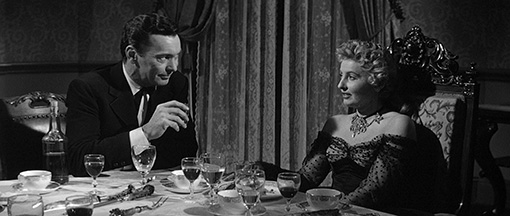
A nod to established gender roles comes in the shape of a soundtrack song that colourfully describes Jessica as "a high riding woman...with a whip," the asks what kind of man will it take to tame her. We can presume that none of her own men are up to the job, so what about these three new arrivals? It turns out they are brothers. Griff Bornell (Barry Sullivan) is a reformed gunslinger who now works for the Attorney General's office and is in town to arrest a man named Howard Swain for mail robbery. With him are his brothers Wes and Chico. Wes (Gene Barry) is a cheerful chip off the older brother-shaped block, but the fatherly Griff is keen that the younger Chico (Robert Dix) should not follow in his footsteps and instead pursue a more respectable career as a farmer, something that appears to get up the eager Chico's nose.
The boys have hardly got settled in town before Jessica's wild younger brother Brockie gets plastered and starts shooting up main street after planting a bullet in the leg of the town's half-blind marshal John Chisolm. Griff quickly puts a stop to this by marching up to Brockie and smacking him out cold with a single pistol blow. Brockie is locked up, but Jessica's having none of it, and in one of the swiftest examples of kangaroo justice I've ever seen (Brockie is out of his cell and heading home even before the judge has finished his quasi-legal spiel), the long-standing status quo is restored. Of course it's not destined to last. When Wes falls in love with the gunsmith's sparky daughter Louvenie, he sets his eye on staying in Tombstone and becoming its new marshal, and when Griff saves Jessica's life during a tornado storm, the two find themselves increasingly attracted to each other. But some of Jessica's men have other plans for this unwelcome interloper.
Typical of Fuller during his golden period, Forty Guns is a blisteringly well-made film, excitingly paced and employing some of the longest walk-and-talk tracking shots the screen had ever seen. He makes terrific compositional use of the monochrome CinemasScope frame, and at one point includes a huge close up of Griff's eyes that foreshadows the iconic use of this very shot by Sergio Leone in his celebrated spaghetti westerns. There's even a point-of-view shot in which Wes observes Louvenie through the barrel of a rifle that draws a partial template for the iconic opening image of every James Bond film to follow. Fuller also delivers what may well be the most hair-raisingly convincing pre-CG depiction of a tornado storm, a superbly staged set piece in which Griff and Jessica battle against ferocious winds that flip a cart over and tear the roof clean off the building they are struggling to reach.
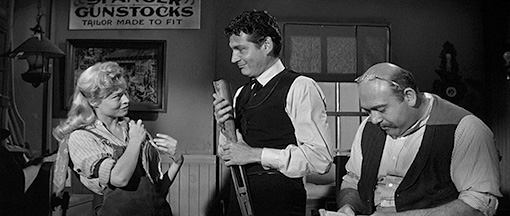
But what really caught me out were the sexual innuendoes, a not uncommon trick in these days of censorial moral watchdogs but rarely as blatantly up-front as this. It kicks off when Louvenie is measuring Wes up for a custom made rifle, and as the pair exchange the filthiest of looks, Wes strokes the wooden rifle stock in a manner that some might suggest has almost pornographic overtones. A short while later he and Louvenie kiss. "I've never kissed a gunsmith before," he tells her. "Any recoil?" she replies with suggestive smile. This run of double-meanings peaks when Griff and Jessica are having a social chat and sizing each other up. Try this for size.
Jessica: |
"I'm not interested in you, Mr. Bonnell. It's your trademark." |
| She holds out her hand. |
Jessica: |
"May I feel it?" |
Griff: |
(shakes head) "Uh-uh." |
Jessica: |
"Just curious." |
Griff: |
"It might go off in your face." |
Jessica: |
"I'll take a chance." |
| Griff reaches below the table to his trousers and pulls out his gun. |
Had I been taking a drink at this point, I'd have probably choked. I have a feeling that Freud would have had a field day here.
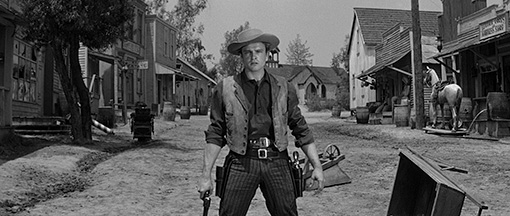
Taking inspiration from Wyatt Earp's time in the real world Tombstone (this connection is not hard to spot), Forty Guns is not just one of Sam Fuller's most accomplished and enjoyable films, it's without question one of the finest westerns of its day. The characters are clearly defined at an early stage (and there are a few to keep tabs on), the dialogue is lively and suggestive, the action tense and exciting, and the sexual undertones playful and daring for their day. And just when you think you know how the film will conclude, we're hit with a couple of startling curve balls (including a finale whose original dark intent is not lost to the studio imposed reshoot) that remind us just who is in the director's chair. Watching the film now almost 60 years after its original release, you can't help wondering why it took so long for Fuller to be recognised for the major and influential talent that he was.
The 2.35:1 black-and-white Cinemascope image is in gorgeous shape, rock solid in frame, as clean as a freshly polished whiskey glass and boasting a lovely tonal range, unwaveringly punchy black levels and no obvious burn-outs on the whites. The crispness of the detail is also noteworthy – it's always impressive when you can clearly make out the wood grain in panelling and every crease and hair on facial close-ups. Lovely.
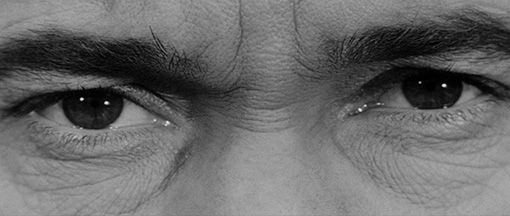
The Linear PCM 2.0 mono soundtrack has the expected range restrictions but is otherwise also in fine shape. The dialogue and music are clearly reproduced, there's no trace of damage and barely a trace of background hiss. A fine restoration all round.
Optional English subtitles for the deaf and hearing impaired are also included.
Fuller at the NFT (77:46)
An audio recording of Sam Fuller answering questions at the National Film Theatre in 1969 to accompany the screening of a season of his films. As it happens, I also attended an interview and Q&A session with Fuller at the NFT about ten year after this, one held shortly before his rediscovery by the new wave of young American directors went public. It seems impossible now, but the audience at that event was so small in size that the compere asked us all to move forward so that the cinema wouldn't feel so empty. Fuller himself, of course, was absolutely wonderful, bristling with amusing stories and winningly forthright about his opinions and his craft. It's a tragedy that there were no cameras there to record his performance, because I still treasure the experience to this day, but fortunately for us all somebody had a tape recorder running during his 1969 visit. Coincidentally, this is almost the same length as film itself, so it effectively runs as a commentary track behind it, and it's a joy from start to finish. Fuller was an absolutely marvellous raconteur, and his growling vocal delivery, boundless enthusiasm, take-no-prisoners honesty and glorious way with words make every story he tells as entertaining as it is revealing. There's just too much here for me to start listing the range of subjects he covers, but there are a whole string of standout moments to sample from. "I hate Jesse James!" he barks when recalling the long process of landing his first film as director (the 1949 I Shot Jesse James). "If I ever met the man in the afterlife I'd stomp him because he was a fake." He recalls his friendship with Luis Buñuel ("a great bartender"), how a meticulously executed shot in the 1969 Shark was ruined by a clumsy studio re-edit and prompted him to ask for his name to be taken of the film, salutes the New Wave French critics and filmmakers, and goes into some detail about the process of creating his more complex camera shots and his reasons for using them. He also outlines how Forty Guns originally ended and why he was forced to add a coda he never planned or wanted. My favourite moment comes when he praises those who would do anything to raise money to buy film stock, his jocular suggestion being that they would even sell babies. "Eight, ten babies," he muses with what is doubtless a broad grin, "three reels." A sublime extra feature.
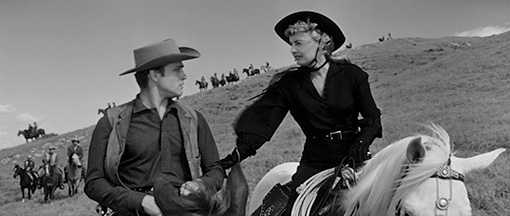
Jean-Louis Leutrat (16:56)
French film critic and writer Jean-Louis Leutrat offers an interesting reading of Forty Guns, its lead performances and the Wyatt Earp connection, and outlines how the film influenced works by Sergio Leone, Clint Eastwood and Jean-Luc Godard. I could have done without the distracting – though occasionally effective – pop art presentation, but it's definitely worth a look.
Theatrical Trailer (2:08)
"Notorious Jessica Drummond leading her 40 thieves to hit the West like a Texas tornado!" Given what happens in the course of the film, that's not as daffy as it originally sounds. Has a couple of major spoilers for newcomers, so don't watch this before settling down for the main feature.
Also included with the release disc is a Booklet featuring new writing by Stephane Joudet, an extract from Samuel Fuller's autobiography, and rare archival imagery, but this was not supplied for review.
Another belting example of why Sam Fuller is so revered by filmmakers and cineastes alike, Forty Guns delivers in spades as a tough, sassy western and thrills in its technique, a fine entertainment that's also a fully fledged lesson in the twinned arts of storytelling and dramatic filmmaking. The film looks lovely on the Blu-ray in this Masters of Cinema dual format release, and even if it were a slightly sub-par transfer (and oh, it is not) I'd still be enthusiastically recommending it for the hugely entertaining recording of Fuller at the NFT. Get this disc.
* For the record, they are, as listed on Wikipedia:
-
The Union Pacific Story. The plot concerns construction of a railroad, a telegraph line, or some other type of modern technology or transportation. Wagon train stories probably fall into this category.
-
The Ranch Story. The plot concerns threats to the ranch from rustlers or large landowners attempting to force out the proper owners.
-
The Empire Story. The plot might involve building up a ranch empire or an oil empire from scratch, a classic rags-to-riches plot.
-
The Revenge Story. The plot often involves an elaborate chase and pursuit, but it may also include elements of the classic mystery story.
-
The Cavalry and Indian Story. The plot revolves around taming the wilderness for white settlers.
-
The Outlaw Story. The outlaw gangs dominate the action.
-
The Marshal Story. The lawman and his challenges drive the plot.
An eighth was later added titled Going Native to include stories like Thomas Berger's Little Big Man, in which a white man or woman makes their home with a native American tribe.
|